IRGC Commander Predicts ‘Divine Victory’ For Hamas in Gaza War
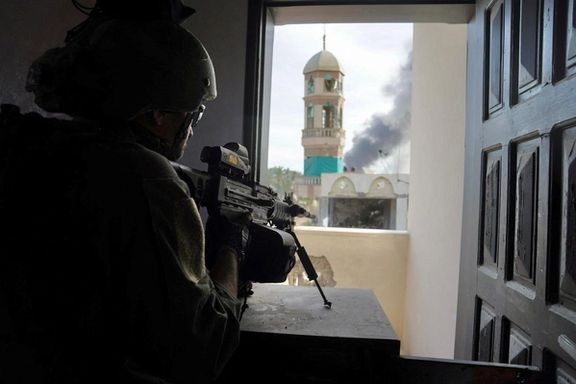
The Commander-in-Chief of the Islamic Revolutionary Guard Corps (IRGC) has predicted a divine intervention ensuring Iran-backed Hamas's victory in its war against Israel.

The Commander-in-Chief of the Islamic Revolutionary Guard Corps (IRGC) has predicted a divine intervention ensuring Iran-backed Hamas's victory in its war against Israel.
Hossein Salami stated Thursday that "according to divine promise, the enemies will soon be defeated", referring to Israel. Claiming the spiritual underpinning of the IRGC, he added, "The IRGC embodies many divine symbols, and its essence and nature are based on piety."
Since the terror attack of October 7, in which Hamas unleashed thousands of its militia to invade the Jewish state, Israel has responded with its most brutal force since the proscribed terror group took control of Gaza in 2007. Around 20,000 Gazans have been killed in the offensive which came after 1,200 mostly civilians in Israel were murdered and 240 more taken hostage to Gaza.
The IRGC, classified as a foreign terrorist organization by the United States, is directing Iran's proxies in countries including Lebanon, Iraq, Syria and Yemen in the wake of the Gaza war. Over 100 attacks have been carried out against US facilities in the region and attacks on Israel from north to south.
As a potent faction in Iran, the IRGC not only oversees a substantial business empire but also commands elite armed and intelligence forces. Washington asserts that these forces are actively involved in a global terrorist campaign.

As Iran’s domestic carmakers lose money due to sanctions, a technological gap and mismanagement, officials are promising to boost the electrical vehicle production.
The only avenue open to Iran is to make deals with Chinese companies and start EV assembly, like fossil-fuel vehicles it produces.
China, dominating the global electric vehicle (EV) manufacturing landscape, holds the largest market share among the top five producers in 2023. Germany and the United States trail, while France and the UK see a rise in EV production. Collectively, these nations wield substantial influence on the global EV manufacturing scene.
The recent UN Climate Change Conference, COP 28, emphasized international efforts to combat climate change, with a focus on EV adoption and greenhouse gas reduction. Major EV brands like Tesla, Kia/Hyundai, and Mercedes spearhead the transition to battery power, while newcomers such as Rivian diversify the market, influencing its ongoing evolution.
In Iran, IKCO introduced the Tara EV, the country's inaugural all-electric vehicle, set for release in March 2024. Developed by IKCO's Jetco division, the Tara EV boasts a 45-kWh battery pack, providing a 300 km range on a full charge. Iran's Minister of Industry, Abbas Ali-Abadi, announced plans for three locally produced EV models by the first half of the upcoming Iranian year (beginning in March).
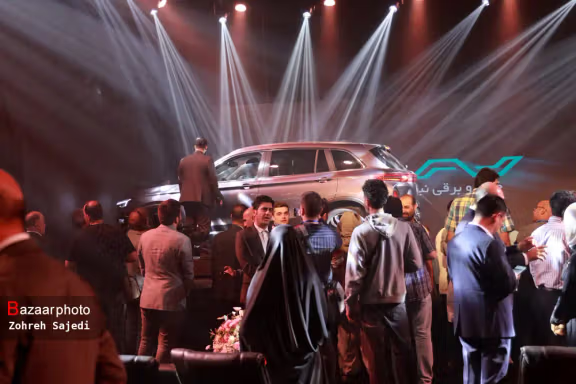
With ambitions for increased EV manufacturing and imports to meet rising demand, the government aims to deploy 100,000 electric taxis in key cities this year that suffer from chronic air pollution. Significant projects, including the launch of Oxygen, Iran's first all-electric car, and MAPNA group's plan for 20 EV charging stations nationwide.
However, Iran grapples with challenges within its auto sector, encapsulated by the term "Car Mafia." This network, alleged to thrive due to the state-owned auto sector's monopoly and inadequate government oversight, faces accusations of financial wrongdoing, evading US sanctions, and contributing to mismanagement. The "car mafia" obstructs the import of reasonably priced cars, manipulating the production of pricier, inferior local vehicles. This term encapsulates various issues within Iran's auto sector, including the impeachment of the industry minister and corruption allegations, portraying it as a formidable and dishonest force negatively impacting the auto industry and vehicle quality.
China’s Dominance in Iran Future EV Market
China's dominant position in the EV industry poses a significant challenge for Iran's plans, particularly concerning the production and processing of essential minerals like cobalt. The reliance on China raises doubts about the feasibility and affordability of Iran's comprehensive EV strategy, emphasizing the need to address China's hegemony over critical minerals for a reliable supply chain.
Global concerns emerge as China's control over vital minerals triggers reactions and export restrictions, impacting the global EV supply chain. The US responds with proposed regulations to limit tax breaks for EVs using minerals or batteries manufactured in China, reflecting the international repercussions of China's dominance in the EV sector.
Despite China and Iran's intentions to collaborate on EV manufacturing, Iran faces challenges in providing sufficient electricity for EV charging amid a natural gas crisis. The gas shortage would impede widespread EV adoption, necessitating steps to encourage renewable energy, which is substantially underdeveloped in Iran.
While automobile companies in Iran claim to be jointly producing electric cars with China, studies indicate that, in the current situation, most automobile companies in Iran are not profitable. Due to government meddling, Iran's state-owned automakers suffer significant losses of $3.7 million a day, or more than $1 billion annually. These automakers battle with demand while being huge businesses, which drives up prices. The issues are made worse by mismanagement, corruption. It will need quick action at the highest governmental levels to stop the car industry from collapsing and to find solutions to its problems.
Concerns about transparency arise in the Iran-China joint development of electric vehicles (EVs), especially considering the paucity of detailed information. This lack of openness raises the possibility that certain Iranian automakers, dubbed the "car mafia," might exploit the circumstances to import EVs rather than actively supporting home production.
The potential dominance of the Chinese in Iran's EV industry and the nation's reliance on vital minerals for battery manufacture underscore the serious flaws in the partnership. The success of Iran's EV plan depends on a clear roadmap, transparent implementation, and strict regulations to counter opportunistic activities in the automotive sector.
To advance a sustainable EV policy in Iran, a commitment to openness, robust regulation, and a shift towards renewable energy sources is essential. Immediate investments in EVs and addressing transportation industry challenges are crucial, emphasizing the need for a proactive and transparent approach to ensure the success of Iran's EV plan.
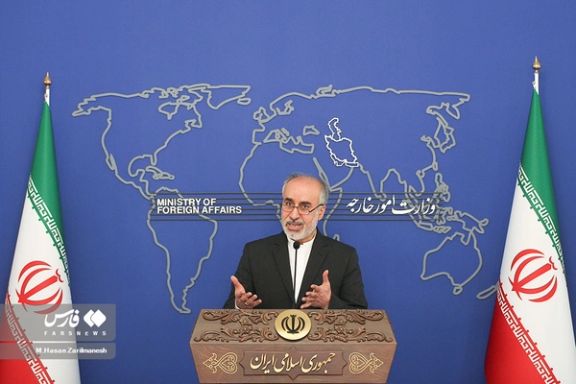
The Islamic Republic condemned Russia’s stance in support of the United Arab Emirates’ sovereignty claims over three Persian Gulf islands.
Iran’s Foreign Ministry Spokesman Nasser Kanaani said on Thursday that Tehran will not show “the slightest hesitation in maintaining its territorial integrity.”
He called the three islands “an inseparable part” of Iran, adding that the Islamic Republic considers as “non-negotiable” its territorial integrity and sovereignty over these islands.
The remarks came a day after the sixth Russian-Arab Cooperation Forum in Morocco concluded with a statement reiterating the UAE’s claim over the islands. The Russian delegation to the forum was led by Foreign Minister Sergei Lavrov.
“The statement supported peaceful solutions and initiatives aiming to resolve the conflict through bilateral negotiations or the International Court of Justice, according to international law and the UN Charter,” the UAE’s Ministry of Foreign Affairs announced.
Moscow had previously voiced its support for UAE’s claim back in July during a joint summit between the Persian Gulf Cooperation Council (GCC) and the Russian Federation.
The three Persian Gulf islands have historically been part of Iran, proof of which can be corroborated by historical and geographical documents. However, the United Arab Emirates has repeatedly laid claim to the islands, describing the situation as “the continued occupation by the Islamic Republic of Iran.”
The three islands fell under British control in 1921 but on November 30, 1971, a day after British forces left the region and just two days before the UAE was to become an official federation, Mohammad Reza Shah sent the Iranian navy to secure all three. Iranian forces remain on the islands, with only Abu Musa having a civilian population which is less than two thousand.
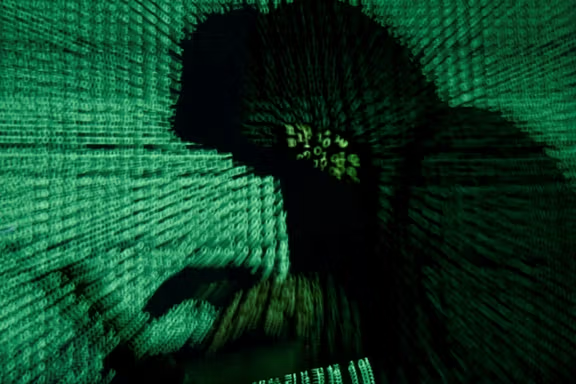
Hackers affiliated with Iran's cyber-espionage group, MuddyWater, have extended their focus to target telecommunications companies in Egypt, Sudan, and Tanzania.
As revealed by cybersecurity researchers, including Marc Elias from Symantec, this marks a departure from MuddyWater's previous emphasis on entities in the Middle East, marking their first known operation against African organizations.
The cyber-attacks, conducted in November against unspecified telecom companies, have not shown evidence of successful information theft. However, analysts suggest that the primary objective of the campaign is likely espionage, based on MuddyWater's historical patterns. There is also speculation about the potential for disruption attacks, drawing on the tactics of Iranian hacking groups in the past.
The hackers' activities in Africa may be influenced by the ongoing Israel-Hamas conflict, with Egypt a prime target due to its proximity to Gaza and Israel.
MuddyWater's recent campaign, analyzed by Symantec, stands out for its use of a PowerShell launcher from a newly identified toolset called MuddyC2Go. Discovered in November, the toolset may have been operational since 2020, granting threat actors remote access to victim systems.
In addition to the PowerShell launcher, MuddyWater deployed other tools, including the legitimate remote device control and management software SimpleHelp. The software, once installed, operates as a system service, providing attackers continuous access and the ability to execute commands with administrator privileges.
Active since at least 2017, MuddyWater has consistently demonstrated an interest in targeting telecom organizations, aligning with broader trends observed among cyber-espionage groups.
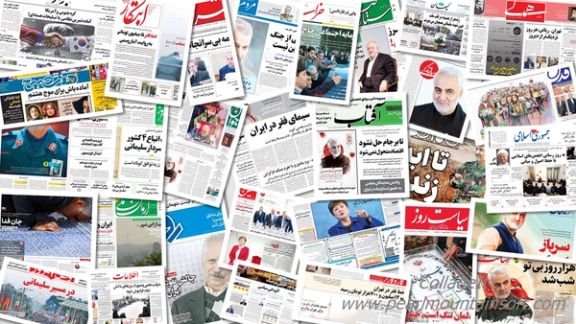
Iran’s Supreme National Security Council ordered newspapers Tuesday night to stop writing about the recent $3.7 billion corruption case that has rattled public opinion.
Nonetheless, three Iranian newspapers ignored the censorship order and ran editorials on the biggest corruption case in several decades in their Wednesday issues. The case involved a tea company receiving billion of dollars from the government with favorable exchange rate for imports but selling the currency in the open market for a hefty profit.
The bravest article appeared on Jahan-e Sanat newspaper. Nader Karimi Jooni, one of the daily's editors wrote, "In a questionable measure, the Supreme National Security Council has called on media managers not to report anything on the corruption case at the Debsh Tea Company any longer." Jooni added that it is not strange that the issue of corruption has turned into a national security issue. "Earlier, not only the press, but also members of the public had been barred from speaking about corruption."
The article was referring to Supreme Leader Ali Khamenei's statement in 2015 ordering the people and the press “to stop discussing corruption as this would be disappointing for the country's officials." Khamenei made the statement after a big embezzlement case in the government-controlled banking system.
According to Jahan-e Sanat, such orders are at times also issued by the Iranian Judiciary, and those who refuse to obey the order will end up in jail. The daily pointed out that the SNSC's order is in contrast with President Ebrahim Raisi's frequently declared policy about confronting financial corruption. The newspaper then asked how a President, who calls for confrontation with corruption, can order the press to stop talking about the biggest such case in the past 45 years.
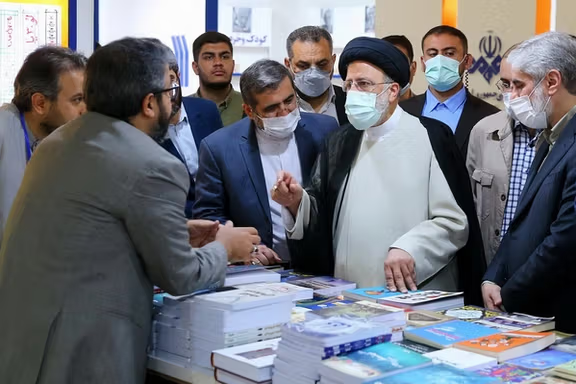
The daily concluded that either Raisi was not honest in making the statement about confronting corruption, or he does not want the issue to be tackled for some reason. The daily further insisted that the press should call for the punishment of those who have benefitted from illegal privileges and concession they received from the government.
Another Tehran daily, Abrar, pointed out that the recent Debsh Tea company’s case is the biggest instance of financial corruption in Iran and not only its managing director should be held accountable, but the government institutions involved in keeping the case secret for months. Presumably the all-powerful Judiciary, the Police, the Customs Administration and the Ministry of Intelligence were all aware and responsible for that. The daily said: "It is surprising that no action has been taken in this regard and no report has been given to the nation about the case. The officials are taking it easy and simply ignore the case as if nothing has happened."
Ironically, Abrar's article about the corruption case was printed next to an article in which President Raisi is quoted as saying that government watchdogs should go easy with managers of state companies and institutions.
The third Iranian daily that discussed the corruption case was Hamdeli, which featured two reports about the corruption case. In one article, Hamdeli wrote: "While the country is facing sanctions and economic difficulties, giving such a large amount of money to a company is an example of financial corruption. But is this going to be Iran's last corruption case?"
The daily then questioned supervisory organizations such as the parliament, the Central Bank of Iran, the Customs Administration's performance and asked why they did not notice such a big corruption taking place.
In another article Hamdeli noted that the tea company in question has also been involved in exporting bitumen on behalf of the government-owned oil industry. Meanwhile, other reports quoted Ahmad Osanlu, the head of the government's "Religious Punishments Organization" as having said that foreign currency continued to be allocated to Debsh even after the authorities received some 50 complaints about wrongdoings in the company.
All this come while Alireza Panahian, an insider at Khamenei's office has encouraged hardliners to gather wealth at any price. He further opined that the country's resources should be left in the hands of religious youths.
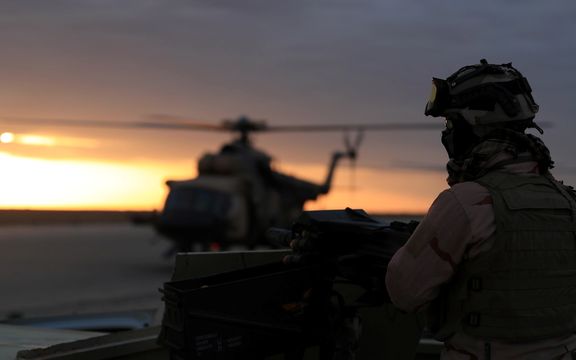
Another US airbase has been targeted by Iran-backed proxy forces in Iraq, taking the attacks since the Gaza war broke out on October 7 to around 100.
Assad Air Base in Iraq’s western province of Anbar, was targeted by a 122mm rocket. The US Central Command (CENTCOM) announced in a post on X that the offensive took place at 7:30 a.m. (Iraq time) on Wednesday. The infrastructure and forces sustained no damage or injury, the post said.
After information shared by the international coalition forces, known as Combined Joint Task Force – Operation Inherent Resolve, Iraqi forces discovered “a flatbed truck modified to launch up to 5 x 122mm rockets,” CENTCOM added.
Since Hamas’s deadly onslaught on Israel on October 7, extremist militant groups in Yemen, Syria and Iraq, backed by Iran, have launched attacks against US and Israeli targets in the region, claiming allegiance with Iran-backed Hamas.
Earlier in the month, US Secretary of State Antony Blinken called on Iraq to fulfill its commitments to protect all bases hosting US troops.
Iraqi Prime Minister Mohammed Shia Al-Sudani has limited control over the Iranian-backed militias, whose support he needed to win power a year ago and who now form a powerful bloc in his governing coalition.
Yemen’s Houthis have also vowed to target US and Israeli interests in the Red Sea, causing the US to form a 10 nation coalition to combat the threats. In spite of this move, the Biden administration is receiving more and more criticism over its failure to deter Iran and its proxies in the Middle East.
Though the Islamic Republic has denied direct military involvement in the Israel-Hamas conflict, the regime has used its allies such as Houthis and Hezbollah to attack Israeli and American targets in the region.